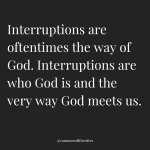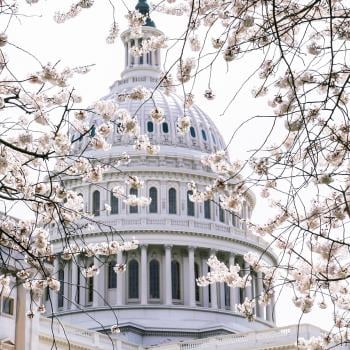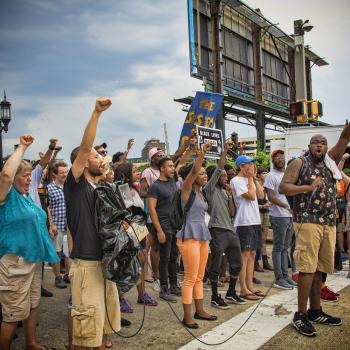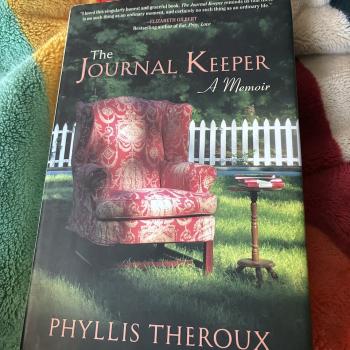Here’s another sermon given at St. Paul’s Episcopal in San Rafael on May 22, 2023. Feels rather evergreen to me, when it comes to the message; I trust it might be the same for you. Enjoy!
—
Yesterday, my boys and I loaded up the foldable wagon: camping chairs, blanket, towels, soccer ball, football, juice boxes, sparkle waters, chips, gluten-free hotdog buns, sunblock, cell phone, keys, and a book, just in case.
We had everything we might need in the event of an emergency, minus, of course, a guarantee of rest and relaxation.
The latter would certainly not be the case, not when we’d be hanging out at a local park for the better part of four hours for an end-of-year third-grade party.

Instead, the kids ran around, playing soccer and tag, tossing beanbags, climbing trees. They played on the nearby playground and found a flat area for foursquare. They ran around, screaming, because if you’ve ever found yourself at a children’s playground, these are the sights and sounds of happiness and joy.
We grown-ups, meanwhile, crowded around the picnic tables. We positioned our bodies toward the grassy area, so we could ideally see our spawn, but most of the time, the kids were running so fast (and admittedly, so out of eye-shot) we couldn’t always see them at first glance.
Until they returned for a bag of chips, another cookie, a bite of hotdog and bun.
Then, we checked in. We wiped faces, opened water bottles, sent them on their way. We returned to our “Very Boring Grown-Up” Conversations (or so I was told), which is to say, we returned to a place of peace in the midst of chaos.
When I sat down to write today’s sermons, I couldn’t help but wonder about our places of peace, about those places of peace in our lives where the Advocate meets us – where the one whom the Father sent in Jesus’ name teaches us everything and reminds us of all that has been said to us.
As I’ve told you before, when I prepare to preach, I sit with the lectionary text for a couple of days. Words and stories, imagery and sentences simmer inside me. Usually, by the time I actually write the sermon, an obvious thread runs through all four of the passages, linking texts together.
The thread I see isn’t necessarily a thread you would see, or even a thread that the next Episcopal preacher down the road would notice as well.
But usually, by the time I get to this point in the process, it’s like the metaphorical thread has become the brightest of colors – a thread of thick yarn haphazardly sewn from one text to the other, so obvious and illuminous I can’t not see it.
That was not the case for me this week.
Instead, I struggled. I kept thinking, how do all of these fit together? What is the hidden link, and why is it still hidden in the first place? What’s the big deal, GOD?
At that point, a text came in: Dad’s doing pretty well, it read. He still needs help with his socks. We took two walks today, just up and down the short block. He’s using his walker, not shuffling as much. He’s having a hard time remembering, but he still calls us by name. He’s in a rather chipper mood!
My mom’s text went on, updating my siblings and I on the stroke my father had a week ago. Maybe that’s when it hit me: I don’t always see the connecting threads, at least not when I’m in the midst of chaos. I can’t always see the threads, not when chaos is all around me.
But peace is present. Peace is there. Peace stands in the middle of the grown-up picnic table area, and with children screaming and yelling on the outskirts, Peace drinks her sparkle water. Peace devours the small reprieve. Peace begs us enter her presence.
I saw this in the character of Lydia: Paul gets a vision of a man from Macedonia begging him come and help. He shows up, not knowing what’s next. “We set sail from Troas and took a straight course to Samothrace, the following day to Neapolis, and from there to Philippi, which is a leading city of the district of Macedonia and a Roman colony.” I mean, his trip is totally chaotic, but then, they meet a “certain woman named Lydia, a worshiper of God.” She listens. All she does is listen – as if listening becomes her job, she proves more powerful than the opposing forces, than all of the chaos that had defined Paul’s journey up until that point.
I saw that in Psalm 67, when the word “Selah” ends two of the lines of song. Selah means to stop and listen. It means to “pause and reflect.” “Forever.” “Peace, be still.” The Psalmist sings, “May God be gracious to us and bless us and make God’s face shine upon us. Selah.”
Let it be so, we dare believe. Let it be peace. Let it be.
Too often, chaos overwhelms our lives: our fathers have strokes. A friend gets a cancer diagnosis. Mass shootings happen in Buffalo and Orange County, in less than a day of one another. Racial hate lies at the center of both.
Our country surpasses more than one million lives lost to the Covid-19 virus. We feel the political divide more strongly than ever before.
Chaos so easily overwhelms us, and still. And yet, peace is here.
In John 14, Jesus reminds his disciples that the Advocate, who is the Holy Spirit, is also peace. “Peace I leave with you,” Jesus says. “My peace I give to you. I do not give to you as the world gives. (So), do not let your hearts be troubled, and do not let them be afraid.”
This chaos is real, but this peace is real too – for this peace is what we carry with us. This peace is the “Selah” end-stop in the beginning and middle and end of the song, the “peace, be still” invitation that lives in the present.
Because what I do not see in Jesus’ words is an admission that there will be an end to the chaos. Jesus does not say that hardship won’t be a part of the story moving forward. That is not the point of life – but peace does become the gift left to us.
Imma give you this peace because your hearts are gonna want to trouble. They’re gonna want to be afraid. And …I’m going to be with you, because this is what I leave you. This is my gift to you. This is what you get to remember.
As you well know by now, just as I start with a story, I tend to end with a story as well. But I had a hard time finding a story that neatly tied everything together – probably because, when we are in the midst of chaos, as much as we believe in the one who is peace, peace isn’t always the first thing we see, the first inkling we sense.
But then I stumbled upon an old Episcopal hymn. The first line just gripped me:
O day of peace that dimly shines
through all our hopes and prayers and dreams,
guide us to justice, truth, and love,
delivered from our selfish schemes.
Sometimes peace merely, simply, dimly shines. But still peace is there. Still, God is present.
At the end, we get to do the only thing we can do: we offer one another peace. When we cannot all the way grasp Christ’s peace, still, we can give Christ’s peace to one another. When our mouths feel so broken they cannot pray peace, still, we can receive peace from one another.
So, my friends: peace be with you.
This we say and believe and repeat, over and over again.
—
How is peace shining, albeit dimly, in your life? I’m honored to hold your thoughts.













